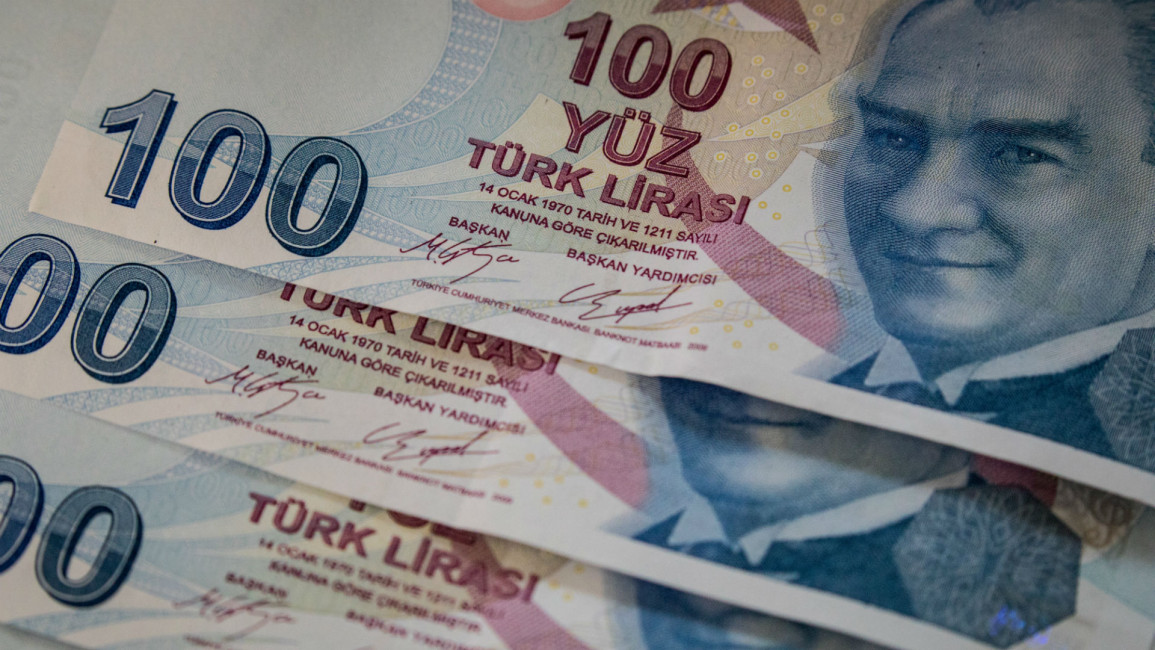Turkey clerics defy tradition to allow interest on state bank loans
Turkey clerics defy tradition to allow interest on state bank loans
Traditional Islamic thought bars lending money with interest rates.
2 min read
The religious body has previously condemned interest as sinful [Getty]
Turkey's top Islamic religious authority has given Muslims permission to take out high-interest home loans, despite more than a thousand years of consensus forbidding Muslims from usury.
The Turkish state Religious Affairs Directorate (Diyanet) on Wednesday said interest on home loans does not violate Islamic law - as long as the loan comes from a Turkish state bank and is used to buy a home in a government housing project.
Issued on Wednesday, the decision has drawn ire on social media, where some have reprimanded the state body for going against hundreds of years of religious edicts. Others have accused the government of bending religious rules to its benefit.
Islam bars believers from partaking in "riba", often translated as usury. The consensus opinion in traditional Islamic thought is that all loan or bank interest constitutes "riba", although some scholars believe the prohibition only applies to exploitative, higher-interest transactions.
Despite that consensus, Diyanet ruled on Wednesday that interest rates on such loans are not sinful as the main purpose is to help low- and middle-income families buy homes, rather than artificially inflate their income, Bloomberg reported.
Taking loans from the bank to set up a business or buy a car, for example, would be sinful, it qualified.
In Turkey, interest-free Islamic banking has risen in popularity in recent years with the socially conservative Justice and Development Party (AKP) in power.
President Recep Tayyip Erdogan has also taken it upon himself to slam interest rates, blaming high levels of interest for rising inflation in the country in an unorthodox philosophy questioned by many economists.
Erdogan last year sacked central bank governor Murat Cetinkaya, allegedly after he refused to back a cut to interest rates.
Diyanet last year ruled against high interest rates as a method to tackle inflation.
"Interest is absolutely forbidden and banned in the religion of Islam. Making permissible that which has been banned by Islam is not in the authority of anyone," said the state body, which was founded in 1924 and oversees all of the country's mosques and imams.
Diyanet has grown substantially since Erdogan's AKP took power in 2002, when the directorate's budget was around 500 million Turkish liras. It has now jumped to 11.5 billion liras ($2 billion).
Critics have connected the Diyanet fatwa (religious edict) to Turkey's 2018-19 economic crisis and its effects on the property market, a major driver of the Turkish economy under Erdogan.
The Public Housing Development Administration (TOKI) began offering large discounts on housing last year. The state has also tried to relieve the property crisis by offering cheap mortgages through state-run banks, leading to a record boom in home sales last month.
Follow us on Twitter and Instagram to stay connected
The Turkish state Religious Affairs Directorate (Diyanet) on Wednesday said interest on home loans does not violate Islamic law - as long as the loan comes from a Turkish state bank and is used to buy a home in a government housing project.
Issued on Wednesday, the decision has drawn ire on social media, where some have reprimanded the state body for going against hundreds of years of religious edicts. Others have accused the government of bending religious rules to its benefit.
Islam bars believers from partaking in "riba", often translated as usury. The consensus opinion in traditional Islamic thought is that all loan or bank interest constitutes "riba", although some scholars believe the prohibition only applies to exploitative, higher-interest transactions.
Despite that consensus, Diyanet ruled on Wednesday that interest rates on such loans are not sinful as the main purpose is to help low- and middle-income families buy homes, rather than artificially inflate their income, Bloomberg reported.
Taking loans from the bank to set up a business or buy a car, for example, would be sinful, it qualified.
In Turkey, interest-free Islamic banking has risen in popularity in recent years with the socially conservative Justice and Development Party (AKP) in power.
President Recep Tayyip Erdogan has also taken it upon himself to slam interest rates, blaming high levels of interest for rising inflation in the country in an unorthodox philosophy questioned by many economists.
Erdogan last year sacked central bank governor Murat Cetinkaya, allegedly after he refused to back a cut to interest rates.
Diyanet last year ruled against high interest rates as a method to tackle inflation.
"Interest is absolutely forbidden and banned in the religion of Islam. Making permissible that which has been banned by Islam is not in the authority of anyone," said the state body, which was founded in 1924 and oversees all of the country's mosques and imams.
Diyanet has grown substantially since Erdogan's AKP took power in 2002, when the directorate's budget was around 500 million Turkish liras. It has now jumped to 11.5 billion liras ($2 billion).
Critics have connected the Diyanet fatwa (religious edict) to Turkey's 2018-19 economic crisis and its effects on the property market, a major driver of the Turkish economy under Erdogan.
The Public Housing Development Administration (TOKI) began offering large discounts on housing last year. The state has also tried to relieve the property crisis by offering cheap mortgages through state-run banks, leading to a record boom in home sales last month.
Follow us on Twitter and Instagram to stay connected



